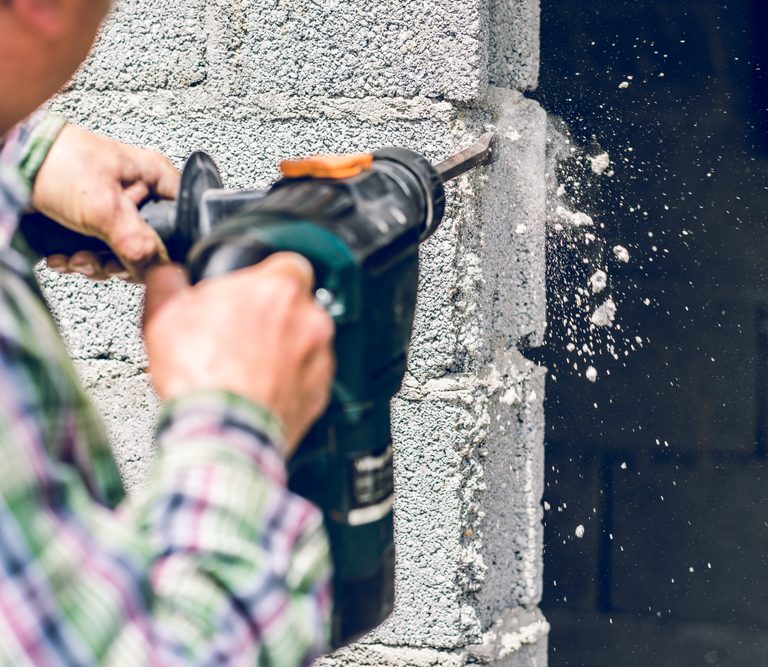If you’re a tradesman or a hobbyist, the quality of your work should never be jeopardized by the quality of your tools. In this guide, you will learn: What is a Hammer Drill? Do I need one? What specific drill is the best tool for the job?
Hammer drills are rotary impact tools that allow a tradesperson to easily drill through concrete, hardwood, or drywall. If you work with these materials often or have a desire to make your hobby more enjoyable, then a hammer drill may be the missing tool in the shed.
While there are many options to consider, such as features, brands, and capabilities, we plan to go through what the best Hammer Drill for your dollar is and clarify which tool is right for you. If you have an idea of what you want and just want to look at the products, check out our product reviews.
- Factors to Consider When Purchasing a Hammer Drill
- Top 10 Best Hammer Drills 2023
- 1. Best Overall Hammer Drill: DEWALT 20V MAX XR Hammer Drill DCD996B
- 2. Best Overall Set: SKIL PWRCore 20 Brushless
- 3. Best Premium Hammer Drill: DEWALT DCH273B
- 4. DEWALT D25263K Rotary Hammer Drill with Shocks
- 5. Makita HR2475 Corded Hammer Drill
- 6. Bosch 11255VSR Bulldog Xtreme
- 7. Best Compact Hammer Drill: Bosch PS130-2A Cordless
- 8. Milwaukee 2607-20 Cordless Hammer Drill
- 9. Best Budget Hammer Drill: Kimo Cordless
- 10. Most Affordable Corded Kit: TACKLIFE Masonry-PID01A
- Guide to Buying the Best Hammer Drill in 2021
- Frequently Asked Questions (FAQ)
- Wrapping Up
Factors to Consider When Purchasing a Hammer Drill
There are many different things to consider when purchasing a new hammer drill in 2021. Here are a few of the key ones: We go into more detail about this in our full guide below.
Corded vs. Cordless
It’s mainly a choice between power and convenience.
A cordless drill may not have the same power output as a traditional corded hammer drill, however being cordless allows you to use it in more places, specifically places without a dedicated power outlet. This makes working on masonry less stressful, as you may be able to save money by not needing a generator or other external power source.
Corded hammer drills are often purchased due to their reliability, power and higher torque output. They get plugged into a standard 110/120V power outlet and therefore never run out of battery, and maybe most importantly, have a consistent power and torque band, unlike some lesser quality cordless drills.
Bare Tool vs. Set
A bare tool is a drill that comes with nothing but the drill. Some bare tools can include a case or a belt clip at this level but not all do. If you see the term bare tool you are generally purchasing just the tool: no batteries, accessories, drill bits, nothing. All of which you’ll also need to use the drill.
Sets are great for when you are buying your first power tools, or buying into a new brand. Sets are usually defined as at least including the battery and charger. Some include drill bits and additional accessories or other goodies that can be useful in using a hammer drill.
Overall, sets generally offer more value and include everything or almost everything you need to get to work. That said, some of the better options on the market come as bare tool only and so make it necessary to have the batteries and other accessories already, or add on an additional purchase.
Brushed vs. Brushless Motors
Electric-powered hand tools have gotten more advanced in the past decade. The brushless motor and the lithium-ion battery are the main reasons why. This section is only about the motors. If you wish to read more about lithium-ion batteries, check out this section.
Brushed Motors are the old standard, using copper brushes and a commutator in order to spin the motor inside the tool. Brushed motors have been around for a long time, and they are generally less expensive upfront, but often require more servicing than the newer brushless motors.
Brushless motors are significantly quieter than brushed motors, which can help your hearing. It is common for a brushless motor to outlive it’s manufacturer’s warranty by some margin, and that is due to the mode of drive that the motor uses.
Overall, brushless motors are the gold standard of electric propulsion at this point in time. Ultimately, they are more efficient and durable than their brushed counterparts.
Speed/Blows Per Minute (BPM)
For hammer drills, speed is measured in blows per minute or how many times the hammer mechanism reciprocates every minute. Most drills have either set speeds or variable speeds based on trigger action.
The higher the speed is, the denser the materials that can be penetrated. Think about your power needs as an order of density: drywall, softwood, hardwood, brick, concrete, steel. Depending on what you’re tackling will give you an idea of the speed you’re looking for. Anything above 3000 BPM is a powerful machine.
Lithium-Ion Batteries
Lithium-Ion Batteries are the same type of battery that powers everything from a watch to a toothbrush to your cell phone or laptop. In recent years they have become the industry standard for powering cordless tools, including hammer drills. Not even drill comes with one bundled, and they can get proprietary with their lines, so if this is your first time buying power tools, think carefully about which brand you want to stick your mast on.
Many companies have their own line of lithium-ion batteries that are interchangeable between different tools. One important note, companies that advertise 18V and 20V batteries are using the exact same number of cells in their respective battery packs. The same is true for units using either a 10.8V or a 12V lithium-ion pack.
Now you have a good idea of what you might be looking for, let’s look at ten excellent performers from off the shelf.
Top 10 Best Hammer Drills 2023
1. Best Overall Hammer Drill: DEWALT 20V MAX XR Hammer Drill DCD996B
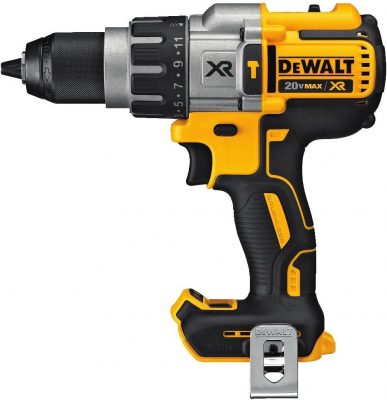
Editor’s Rating:
Quick Facts
- Power Source: Cordless, Lithium-Ion Battery (Sold Separately)
- Weight: 4.7 Pounds
- Speed: 3 Stage 0-38, 250 2,250 BPM
This bare tool comes in at just under $170, which feels like a steal. As far as features are concerned, this drill includes a 3 stage variable speed gauge, a high-performance brushless motor and the battery life with the 20V Max* battery system that you would expect. Being a bare tool, though, you’ll need to have the accessories, which can drive up the cost.
It deals with concrete no problem as long as you have the right drill bits for the job. It also has the normal driver mode for the day to day uses that you as a homeowner or professional tradesperson may have.
This drill rides the line between DIY and Professional grade. The only issue you might have is the battery running out on you prematurely. We would always recommend getting at least one extra battery if you are planning on using this tool in a professional capacity.
Value Proposition
The DEWALT DCD996B is a fantastic value for money. It’s one of the two logical choices for professionals who want a reliable, ergonomic cordless hammer drill. The build quality and features built into this model offer a technologically advanced tool with great durability.
Pros
- Extremely high value per dollar
- Solid Construction
- DEWALT 20V Max* Family 2A-9A
- Brushless 820 UWO motor
Cons
- Only available as a Bare Tool
- Batteries not included
2. Best Overall Set: SKIL PWRCore 20 Brushless
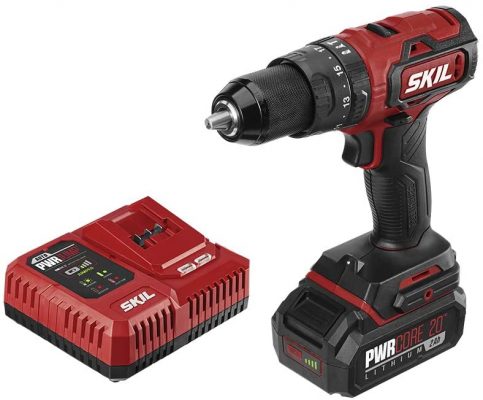
Editor’s Rating:
Quick Facts
- Power Source: Cordless, Brushless Motor, Lithium-Ion 20V Battery (included)
- Weight: 5.26 Pounds
- Speed: 17 Selectable Torque Speeds, 450 in/lbs of torque max.
Not much separates SKIL PWRCore 20 Brushless and the DEWALT DCD996B as a raw tool, and this one comes with accessories too.
SKIL uses its own proprietary battery system known as PWRCore 20, much like many other companies. If you already own other PWRCore 20 tools it would be silly to buy into another brand, especially when SKIL is offering a top quality product. However, that proprietary journey might start with this kit, which will preclude you from buying a DEWALT later without having to invest in an additional charger.
Still, the SKIL includes a great battery and fast charger that can recharge your batteries in around five minutes. The lithium-ion battery rated at 2A and the PWR jump charger are both added bonuses that many companies do not include. DEWALT usually only offers its tools as a bare tool and not as kits.
The drill has three unique settings, hammer drill, regular drill and screwdriver drill. These alone make it possible to go from three drills to one, which is invaluable, especially on a job site – or for purchasers with limited garage space.
If you also take into account the brushless motor, the insane levels of torque and the reliability that surrounds SKIL tools, then this is a very attractive option. The drill has three unique settings, hammer drill, regular drill and screwdriver drill.
SKIL’s newest cordless hammer drill is ideal for both tradespeople and DIYers. Aside from being a bit heavy, this feels about as close to perfectly balanced between price and features as is available on the market today.
Value Proposition
For a reasonable price, you get an above-average tool. The value here is mostly in the quality components and features that are included at no extra cost.
The drill has three unique settings, hammer drill, regular drill and screwdriver drill.
Pros
- Inexpensive
- Comes with battery and quick charger
- Ergonomic Design
Cons
- Only 1 bit included
- Heavy
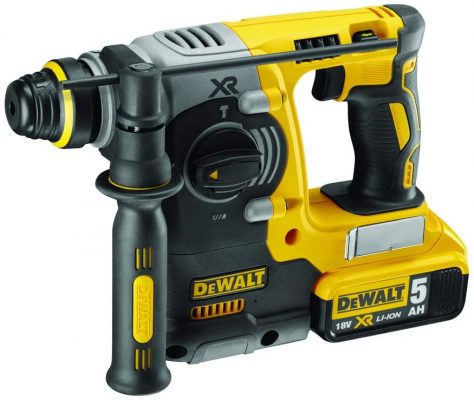
Editor’s Rating:
Quick Facts
- Power Source: Cordless, Lithium-Ion Battery (Sold Separately)
- Weight: 6.4 Pounds
- Speed: Variable 0-4,600 BPM
Are you tired of always having to choose between power and portability? The DEWALT DCH273B is a powerful cordless drill that gets any job done. At over $300 it’s not a cheap piece of equipment, but if you spend your workdays on the construction site and need a hammer drill as part of your daily routine, then this has you covered.
Usually, ultra-premium tools and gadgets are overpriced. How do we justify spending over $300 on this tool? It’s simple. It’s the most powerful and durable hammer drill on the market. On top of that, it comes with DEWALT’s famous manufacturer’s warranty as well, 3 years limited warranty, 1-year service coverage and a 90-day money-back guarantee. It’s brushless, cordless, durable and will do the job you need it to do every time.
The DEWALT DCH237B can cut through concrete like a knife through butter with its 2.1 Joules of impact energy. Its brushless motor is quiet in comparison to the other options on the market. Last but not least, battery compatibility and quality make it so that if you already own other DEWALT 20V Max* or 60V batteries, you won’t need to fork out additional cash.
Value Proposition
The DEWALT DCH237B is in a class of its own. It makes no compromises and has a ton to offer the professional. We would recommend this drill to everyone except for budget-conscious buyers.
Pros
- Brushless Motor
- Quiet
- 20V Max* Battery system compatible
- Great Manufacturer's Warranty
Cons
- Expensive
- Not usually available as a kit. Bare Tool Only.
- Doesn’t Include the dust extractor
4. DEWALT D25263K Rotary Hammer Drill with Shocks
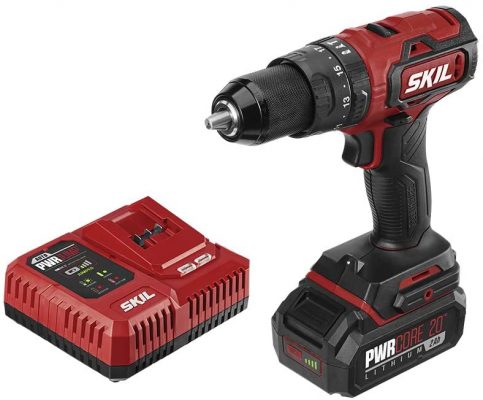
Editor’s Rating:
Quick Facts:
- Power Source: Corded, 8.5 Amp Brushed Copper Motor
- Weight: 12.2 Pounds
- Speed: 0-4,300 BPM
DEWALT makes really good tools. The D25263K is a bit different than the other two options in a few minor ways and a couple major ways.
Let’s start with a few of the minor, yet important differences. This hammer drill is much heftier than the other two options that weigh less combined than this does on its own. Like the Makita HR2475, its weight can actually be an advantage for stability and control. This specific model is also running an older copper brushed motor as compared to the newer brushless ones.
One of the most obvious differences between the D25263K and the DCH273B is that this one is corded and the other options from DEWALT are cordless.
The D26263K has the heft and feel of a “designed for professionals” hammer drill. This does come as a bare tool without a case, but its price is in line with that reality. This is also the best heavy-duty corded model on the market that doesn’t make many compromises to keep the price down.
We would recommend the D25263K to professional craftsmen and women who need the most durable and reliable tool on the market without breaking the bank. It’s not flashy, but it does the job right.
Value Proposition
DEWALT makes many fantastic tools and always seems to offer the best of the best at each individual price point and the D25263K is no exception. The lack of any additional accessories does bring the total value down slightly but as a whole the asking price is fair.
Pros
- Weight and Stability
- Proprietary Shocks Technology to deter wrist and arm fatigue
- Comes with DEWALT’s Manufacturer’s Warranty
Cons
- Brushed Copper Motor
- No variable speed settings
- Bare Kit only
5. Makita HR2475 Corded Hammer Drill
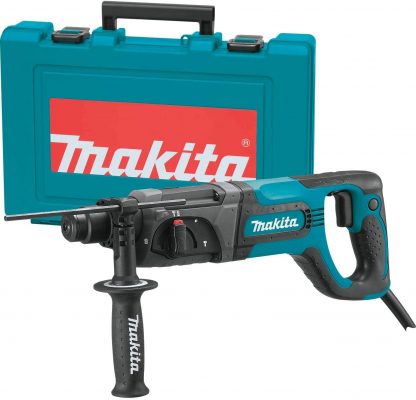
Editor’s Rating:
Quick Facts
- Power Source: Corded, 7.0 Amp Brushed Copper Motor
- Weight: 10.7 Pounds
- Speed: 0-4,500 BPM
Makita has always made high-quality construction-grade tools at an affordable price and the HR2475 is no exception. Its iconic color scheme allows us to have nostalgic feelings when we think of the great tools of the past. As far as heavy-duty hammer drills are concerned, this is one of the better ones out on the market today.
The HR2475 comes as a bare tool but also comes with a Makita hard case which does add some value. However, there are no other accessories.
It does feel good to use as it has plenty of power and torque packed into this beast of a drill. Weighing in at over ten pounds, it is one of the heaviest drills on the list. This isn’t always a bad thing though. In the case of the HR2475, we would actually say it’s probably a positive. It feels powerful, and when used on a massive concrete block, actually is powerful. It slices through concrete with no effort at all.
There are a few issues with the drill though. Makita decided to simply rejuvenate their older copper brushed motor instead of upgrading to a brushless motor for this model. It really feels like a waste of potential.
One other issue that did rear its ugly head feels like somewhat of an engineering oversight, a “lock-on” button. The problem with this specific function or feature is that it can be a safety hazard if you are not careful, but maybe more importantly, can blow out the motor if you aren’t paying close attention. A brushless motor would have easily balanced out these negatives because of the increased durability and longevity.
Makita’s HR2475 is a solid choice for experienced hammer drill users. It is on the heavier side of things so keep that in mind when making a purchasing decision as it may be harder to handle than other drills on this list. Despite this, it is one of the better heavy-duty multifunction hammer drills available.
Value Proposition
The Makita HR2475 is a high-quality hammer drill with a price to match. It’s expensive. For the most part you get what you pay for, however in this case it feels a little overpriced. If it happens to be on sale, that’s when you would want to pick it up.
Pros
- High Power and Torque
- Solid Construction
- Hard Case Included
Cons
- Heavy
- Slightly Overpriced
- “Lock On” Function can be a safety concern
6. Bosch 11255VSR Bulldog Xtreme
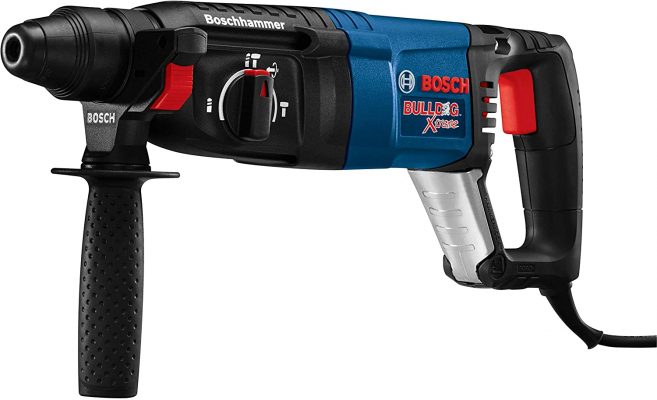
Editor’s Rating:
Quick Facts
- Power Source: Corded, 7.5 Amp Brushed Copper Motor
- Weight: 10.4 Pounds
- Speed: 0-5,800 BPM
The Bosch has the same usage and style of both the DEWALT D25263K and the Makita HR2475. The Bosch does lag behind slightly for a couple of reasons, but that doesn’t mean it’s not one of the better hammer drills on the market.
The Bulldog is also a corded rotary hammer drill powered by a copper brushed motor with a solid power-to-weight ratio. While you can buy it as a bare tool, we highly recommend picking up the dust attachment because the exhaust is at an angle that can blow into your face if you aren’t careful.
However, it’s slightly too expensive. Both the DEWALT and the Makita are very similar for a lesser price, especially if you buy the dust attachment. Because we feel the dust attachment is almost required due to the exhaust, then it has to be factor. It does have a slightly better recoil system than the Makita, but less impressive than the DEWALT.
As far as using the drill is concerned, the Bulldog has three functions, hammer, hammer rotary, and rotation only, all controlled by the variable speed trigger. It is fully capable of carving through concrete, chipping tile, or drilling holes into bricks. This video has more information about how to properly drill into brick, if that’s your intended use for the product.
We would recommend the Bosch Bulldog to those who don’t mind spending a little bit more on a hammer drill for the Bosch name. This specific drill is targeted more at the professional than the DIYer, but there is no reason why it wouldn’t work for both groups of craftsmen.
Value Proposition
Overall the Bosch Bulldog is a solid 3-in-1 rotary hammer drill. The price is slightly higher than the value you are getting, but that doesn’t mean it’s not a fantastic tool. This is a classic example of “wait for a sale” or being a target of brand loyalty. The fact that it does not include the dust attachment is a miss by Bosch and we would have liked to see it included in the bare tool.
Pros
- 3-in-1 Rotary Hammer Drill
- Above-average recoil control
- Very high BPM
Cons
- Dust Attachment sold separately.
- Slightly overpriced
- Copper Motor
7. Best Compact Hammer Drill: Bosch PS130-2A Cordless
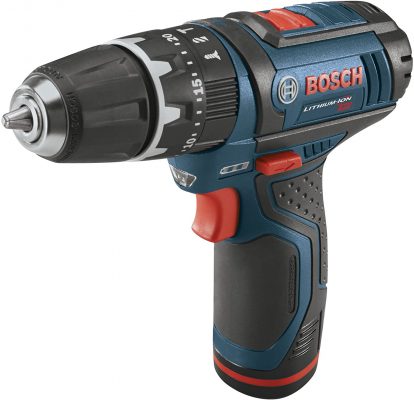
Editor’s Rating:
Quick Facts
- Power Source: Cordless, 1.3 Amp Brushed Copper Motor 12V Lithium-Ion Battery
- Weight: 2.3 Pounds
- Speed: 0-19,500 BPM
This is the one and only true compact hammer drill available right now. Weighing in at just over two pounds with the battery and bit installed is quite the achievement considering the speed and power that this tiny drill is capable of. The PS130-2A is the ideal drill for occasional at-home use.
Because it has the driver function in addition to the hammer drill function, this is a solid pickup either way. We love that Bosch includes 2 12V batteries and the wall charger especially because of the lower capacity in comparison to bigger models such as the DEWALT DCD996B which uses a 20V battery in a bigger overall frame.
The one thing that does concern us about the PS130-2A is that this model is using a copper brushed motor. On smaller hand drills, this can really cause a problem if you overheat it or push it past its breaking point.
This is clearly the best small form factor hammer drill on the market. It is reliable, easy to use, and still has enough power to drill into masonry. We would recommend this to condo/apartment owners or other people who have a less than ideal amount of storage space for tools.
Overall the PS130-2A is a solid little hammer drill that can both carve through dense materials like butter and still hold its own as a normal driver drill as well.
Value Proposition
It’s slightly expensive, however the dual-use and its compact size are the reasons for that. Bosch includes the battery charger and two 12V Lithium-Ion batteries as well as a carrying case, so as long as you have drill bits you get what you need out the box. All in all the PS130-2A is a cross between a premium hammer drill and a compact driver drill.
Pros
- Compact form factor
- Lightweight
- Batteries and Charger Included
Cons
- Expensive
- Copper Brushed Motor
- No bits included
8. Milwaukee 2607-20 Cordless Hammer Drill
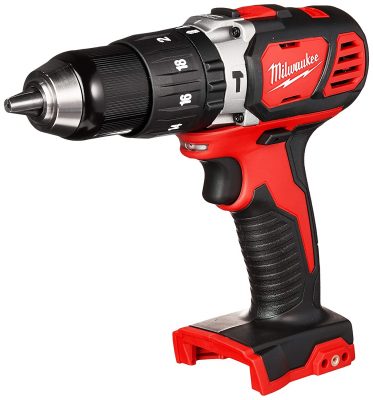
Editor’s Rating:
Quick Facts
- Power Source: Cordless, Brushed Copper Motor 18V Lithium Ion Battery
- Weight: 3.4 Pounds
- Speed:1800 rpm
Milwaukee enters the fray with their own cordless hammer drill, the 2607-20. It is a solid bare tool option with a flashy design that doesn’t cost an arm and a leg. And you’ll definitely need two arms to use this hammer drill. It has an absurd amount of torque but is plagued by one major issue, a loose chuck.
For the most part, this appears to be competing with the Bosch PS130-2A in the cordless compact hammer drill category. It does a fairly good job performance wise, however the price is so similar to the Bosch and this one does not include batteries or a charger or even a case and bits.
We think that if you own other Milwaukee tools that use their M18 battery line then this would be recommended over the Bosch. For everyone else, the Bosch is just a better drill.
Overall, we would recommend this only to people looking for a compact 2-in-1 cordless hammer driver drill that already owns Milwaukee tools. The 2607-20 can be a worksite drill but we would probably advise against using it on very dense materials for long periods of time.
Value Proposition
While the Milwaukee 2607-20 is a solid drill, it is missing many features and accessories that would really make it a good investment. Those of you who already use Milwaukee M18 tools will find this to be adequate and sufficient for the price that they are asking.
Pros
- LED is very useful
- Active Battery Gauge
- Light and Quiet
Cons
- Cheap build quality
- No battery, charger or case included
- Copper Brushed Motor
9. Best Budget Hammer Drill: Kimo Cordless
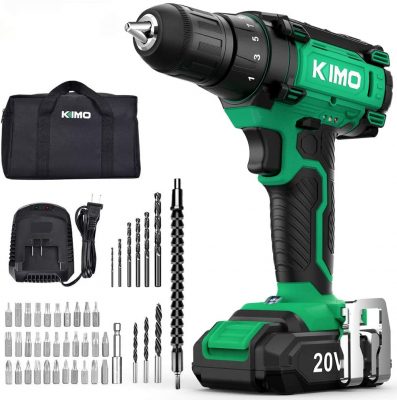
Editor’s Rating:
Quick Facts
- Power Source: Cordless, Lithium-Ion Battery, Copper Brushed Motor
- Weight: 3 Pounds
- Speed: Variable 2-speed 0-350 & 0-1,350 BPM
Kino is a lesser-known brand. It certainly doesn’t look the part. However, this drill/cordless drill 2-in-1 comes with everything the average DIYer might need. The case, drill bits, and battery and charger all come included. This is alongside it being the cheapest cordless drill on the list. It comes awfully close to what the bigger companies are offering at almost half the price.
Let’s be clear here, if you are looking to buy a tool for constant workplace use, we would recommend the DEWALT DCH237B, but for everyone else, this is the one for you.
The Kino Cordless will drill into stone and concrete. Although we recommend using this for softer materials: wood, fencing, or drywall. The power is a bit underwhelming, and that is particularly due to the brushed motor. Quite a bit of efficiency has been lost, but money has also been saved. At this point it really comes down to what you the buyer values more; money or efficiency.
Value Proposition
The Kino Cordless Hammer Drill comes with many valuable accessories and addons. It comes with 42 drill bits, a proprietary 20V lithium-ion battery (and charger), and a case. It is usually available as a full kit for under $80. For people who may not need the tool often, this is probably the right choice as it is usually cheaper to buy this than to rent a tool from a local store.
Pros
- Ready to use out of the box
- Great battery life
- Inexpensive
Cons
- Not the best for penetrating concrete
- Copper Brushed Motor
10. Most Affordable Corded Kit: TACKLIFE Masonry-PID01A
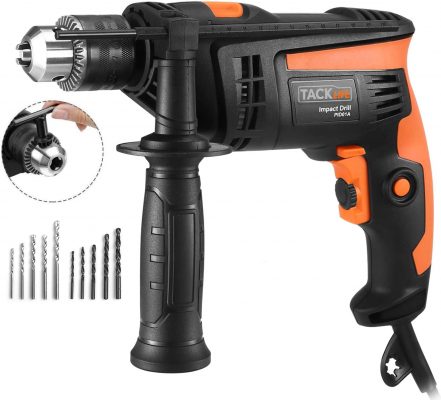
Editor’s Rating:
Quick Facts
- Power Source: Corded, Copper 6 Amp Brushed Motor
- Weight: 4.28 Pounds
- Speed: 12 Speed Variable 0-2,800 BPM
Tacklife has been around for some time, churning out price-sensitive products of above-average quality. Their hammer drill is no exception. The PID01A is the ideal entry-level corded hammer drill of 2021. No other brand offers a corded hammer drill of this quality at this price.
When you use the Tacklife you will notice differences from some of the more well-known brands. It does have a rather unintuitive speed selection system which can cause an intense torque pull or push.
The drill bits that are included in the kit are not made for masonry, but will do fine for normal drilling into softer materials. This drill is not recommended for heavy concrete work. The motor and hammer functions are less than impressive when it comes to extremely dense material for an extended period of time.
This specific drill is ideal for users looking to buy a corded drill for around the house or shop and are occasional users of the hammer function. We would not recommend this to tradespeople simply because the longevity of the motor seems average at best, and you really can’t afford waiting for a replacement if you need it for your job.
Value Proposition
The company offers a drill with hammer drill functions for cheaper than any other brand. However, it doesn’t come with any accessories and it also has an outdated copper brushed motor.
The price and dual functions are enough for us to recommend to DIYers and homeowners who need a drill occasionally.
Pros
- Inexpensive
- Dual Function--Hammer and Regular Drill functions
- Speed and torque is above average
- Drill bits and accessories are cheap
Cons
- Heavy and not very ergonomic
- Not rated for dense masonry
- Some Quality Assurance issues.
- Drill Bits included are of poor quality.
Guide to Buying the Best Hammer Drill in 2021
If you’re thinking about a hammer drill and want a deeper dive into the factors we considered when making this list, let’s give you the detail.
Corded vs. Cordless
Hammer Drills are available in two different styles, Corded and Cordless. Below we will explain what the advantages and disadvantages are between the two styles of drills.
Cordless
Cordless hammer drills generally have less penetration power than corded drills do. One of the biggest advantages of a cordless drill is its mobility and ease of use compared to heavier corded drills.
Often, cordless power tools are lighter and more easily maneuverable than traditional corded tools and because of this, storage is much less of a hassle. In our opinion, cordless hammer drills are usually the better choice for infrequent users, hobbyists, and at-home DIY.
Corded
Corded drills are generally less expensive because of the lack of an external power source such as a lithium-ion battery pack. Corded hammer drills are often chosen due to their reliability, power, and higher torque output. They get plugged into a standard 110/120V power outlet and therefore never run out of battery, and maybe most importantly, have a consistent power and torque band unlike some lesser quality cordless drills.
Corded drills can make working on masonry less stressful, as you may be able to save money by not needing a generator or other external power source.
For example, if you have other cordless DEWALT power tools at home or at the shop, then it might be worth seeing if the DEWALT 20V MAX XR Hammer Drill’s batteries are compatible with your existing tool kit.
With power comes great responsibility; however, corded drills can be a pain to store due to the power cord, their size and lack of convenience. Therefore, we would only really recommend a corded drill if you need it for your job and have a reliable power connection.
For most non-commercial users, the cordless drill’s convenience and mobility usually outweigh the difference in power and torque that the corded drills possess.
Now that you have the proper understanding of the two main types of hammer drills, we can now go over some of the other features that you may find important.
Bare Tool vs. Set
What are you actually getting when you order your drill? This is basically what we’re talking about when we mention a “bare tool” or a ‘toolset.’ A bare tool will be just as it sounds. You get the tool, and nothing else, no bits, no batteries, nothing.
This is fine for experienced craftspeople who may already have many of the addons that are usually included in a set. It’s also important to note that the bare tool version of each drill is usually significantly cheaper than buying in a set version.
Tool sets are great for when you are buying your first power tools or buying into a new brand. For example, this is a corded hammer drill that comes with a set of 10 bits (valued at around $15), included at no extra cost. The TACKLIFE PID01A also comes with a 360-degree handle, a depth gauge and a chuck key.
Brushed vs. Brushless Motors
There are two types of motors that can power an electric hammer drill. They are a copper brushed motor and a brushless motor with an ESC (electronic speed controller).
You may be familiar with what it’s like to use a bad brushed motor—low power, slow speeds, no torque. These can be repaired and restored, however it is usually less expensive to replace than repair at this point in time. Just know that if you are looking to replace a beloved tool, it might be able to be given new life with a motor tune-up.
Now for the newest trend in electric motor technology, the brushless motor. Brushless motors are significantly quieter than brushed motors, which can help save your hearing. But more importantly they are more efficient and durable than their brushed counterparts.
It is common for a brushless motor to outlive it’s manufacturer’s warranty by some margin, and that is due to the mode of drive that the motor uses. Instead of the copper brushes that can degrade and cause problems over time, a brushless motor uses magnets inside the motor casing and an electronic controller to regulate speeds.
Brushless Drills are statistically better in every way except for one, price. If you only want the best of the best, brushless is the way to go. If you are a casual hobbyist or occasional DIY’er then it may not make economic sense to buy a brushless powered drill.
Lithium-Ion Batteries
Make sure to check the product page and descriptions to make sure that the drill you are purchasing comes with a battery and charger. This is especially important for folks who may not have power tools in the garage already.
In this guide, we have only recommended cordless drills that use lithium-ion batteries because we are not going to vouch for an outdated or antiquated system such as Nickel Metal Hydride or Nickel Cadmium.
Each company has its own proprietary battery system that usually only works on tools from the same brand. This helps these tool companies build required brand loyalty. Unfortunately, it does lock you, as a customer, into their ecosystem.
Here are some things to look out for when looking at certain lithium-ion batteries.
The 20V Max* is mainly a marketing gimmick. Put simply, both the 18V and 20V Max* battery packs use the same five lithium-ion cells. The five cells have an average voltage of 3.6V equaling 18V.
DEWALT shows you the Maximum Voltage possible, which for these specific battery cells is 4V. 5 cells by 4V equals 20V maximum. The battery cells used by Bosch are the same as the ones used by DEWALT. They both have the same potential maximum of 20V.
The difference is, one company, DEWALT, is telling you the best possible scenario, and the other company is telling you what you can reasonably expect, Bosch.
Frequently Asked Questions (FAQ)
Do I Need a Hammer Drill?
If you are trying to drill into stone, concrete, brick, or other masonry then it is highly recommended that you use a purpose-built hammer drill because it will be more efficient and won’t destroy your other tools.
Can a Cordless Hammer Drill Drill Through Concrete?
Absolutely. Cordless hammer drills are just as capable of slicing through concrete as corded drills. It may take slightly longer to do so but overall it should not be an issue.
What Is the Difference Between a Rotary Drill and a Hammer Drill?
Rotary Drills are usually used in the same ways a jackhammer can be used. A hammer drill is a less powerful tool that is used to drill holes into masonry, wood or drywall more effectively. Destruction vs Precision.
Wrapping Up
We hope that this guide has helped you make a smart, informed purchasing decision regarding your next hammer drill. Buying tools can be stressful, but it can also be fun. This guide should have taken some stress or doubt off your mind, now enjoy the fun of finding your next loyal tool.
